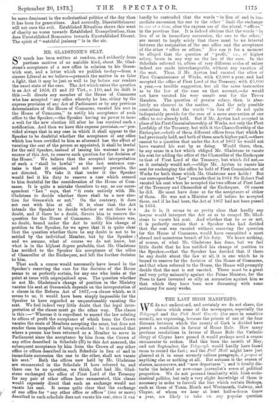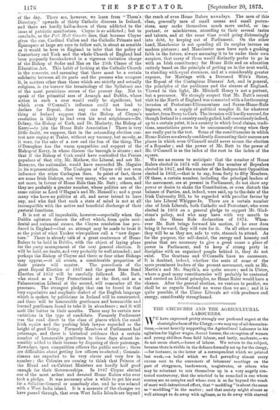THE LAST IRISH MANIFESTO.
WE do not understand, and certainly we do not share, the alarm which some of the newspapers, especially the Telegraph and the Pall Yall Gazette (for once in sensitive accord), are expressing, because the priests of one of the four dioceses between which the county of Cork is divided have passed a resolution in favour of Home Rule. How many previous resolutions in favour of Home Rule the Catholic clergy of Cloyne have passed it would perhaps need a census enumerator to reckon. Had this been the month of May, and not September, the Telegraph would hardly have found room to record the fact ; and the Pad Mall might have just glanced at it in some serenely callous paragraph, a propos of anything else or nothing at all. But autumn is the season of alarms, manceuvres, and "new departures "; and it fatally dis- turbs the belated or new-come journalist's sense of political proportion. We do not pretend familiarity with Irish eccle- siastical politics, but only a very slight knowledge of them is necessary in order to foretell the line which certain Bishops, such as those of Tuam, Meath and Westmeath, Galway, and Cloyne, of whom we hear at least half-a-dozen times a year, are likely to take on any popular question of the day. There are, however, we learn from " Thom's Directory," upwards of thirty Catholic dioceses in Ireland, and there are hardly half-a-dozen of them addicted to the issue of patriotic manifestoes. Cloyne is so addicted ; but to conclude, as the Pall Mall Gazette does, that because Cloyne gives the cue, Cardinal Cullen and the Catholic Primate and Episcopate at large are sure to follow suit, is about as sensible as it would be here in England to infer that the policy of Canterbury and York and the whole Church of England had been purposely foreshadowed in a vigorous visitation charge of the Bishop of Sodor and Man on the 25th Clause of the Education Act. This habit of looking at the Catholic Church in the concrete, and assuming that there must be a certain solidarity between all its parts and the persons who compose it, in matters other than those which are strictly and actually religious, is (to borrow the terminology of the Syllabus) one of the most pernicious errors of the present day. Not to speak of the primatial sees of Armagh and Dublin, whose action in such a case would really be significant, but which even O'Connell's influence could not lead to declare for Repeal, does any one who knows any- thing of Ireland suppose that the Bishop of Cloyne's resolution is likely to lead even his next neighbours—Dr. Delany, the Bishop of Cork, and Dr. Moriarty, the Bishop of Kerry—to join the Home Rule Association ? There is very little doubt, we suppose, that in the astounding election con- test now raging at Tralee, without any vacancy, but merely, as it were, for the sake of a row and the fun of the thing, The O'Donoghue has the warm sympathies and support of the Bishop-of Kerry, in whose diocese the borough is situate ; and that if the Bishop of Cork could have controlled the Fenian populace of that city, Mr. Mathew, the Liberal, and not Mr. Ronayne, the nationalist, would have succeeded Mr. Maguire in its representation. The Ucalegon of Cloyne will not even influence the other Corkagian Sees. In point of fact, there are some Irish Bishops, not very many, who are as much, if not more, in favour of Home Rule than Mr. Butt ; others, and they are probably a greater number, whose politics are of the same colour as Lord O'Hagan's and Mr. Monsell's ; and a great many who have no politics at all, and never intend to have any, and who find that such a state of mind is not at all incompatible with the active and beneficial discharge of their pastoral functions.
It is not at all improbable, however—especially when the Dublin agitators discern the effect which, from quite acci- dental and autumnal causes, the Cloyne resolution has pro- duced in England—that an attempt may be made to treat it as the point of what Yankee wire-pullers call a "new depar- ture." There is already talk of a great conference of Home Rulers to be held in Dublin, with the object of laying plans for the party management of the next general election. It will be held, no doubt, and very probably be well attended ; and perhaps the Bishop of Cloyne and three or four other Bishops may appear,—at all events, a considerable proportion of
their priests will muster. The precedents of the great Repeal Election of 1847 and the great Brass Band Election of 1832 will be carefully followed. Mr. Butt, who stood as a Tory Protectionist at the first, and as a Palmerstonian Liberal at the second, will remember all the processes. The strongest pledge that can be found in that very superlative and emphatic dialect of the English language which is spoken by politicians in Ireland will be constructed, and there will be honourable gentlemen and honourable and learned gentlemen found to take it in abundance ; and it will melt like butter in their mouths. There may be certain new variations in the type of candidate. Formerly Parliament was the road direct to the class of places which the small Irish squirs and the pushing Irish lawyer regarded as the height of good living. Formerly Members of Parliament had patronage, and there is historical evidence that a certain number of honourable gentlemen in those days almost in- sensibly added to their income by disposing of their patronage. Nowadays, open competition officers the public service ; there are difficulties about getting law officers re-elected ; Commis- sioners are expected to be very clever and very few in number ; the Colonies are coming to think that Princes of the Blood and ex-Cabinet Ministers are hardly half good enough for their Governorships. In 1847 Cloyne elected one of the most ardent and devoted Home Rulers who ever took a pledge. It was necessary after a while to get his seat for a Solicitor-General or somebody else, and he was solaced with a West India island. It is a measure of the changes we have passed through, that even West India Islands are beyond the reach of even Home Rulers nowadays. The men of this class, generally men of small means and small preten- sions, may make themselves much more useful, or im- portant, or mischievous, according to their several tastes and talents, and at the same time avoid going distressingly into debt, by keeping out of Parliament. On the other hand, Manchester is not spending all its surplus income on modern pictures ; and Manchester men have such a gushing faith in the future, always assuming it to be under their own auspices, that many of them would distinctly prefer to go in with an Irish constituency for Home Rule and an education entirely based on the principle of getting on in the next world, to standing with equal sternness, and at a considerably greater expense, for Marriage with a Deceased Wife's Sister, the Repeal of the Contagious Diseases' Act, and in general, the principles of the publicans and the sinners of England. Viewed in this light, Mr. Mitchell Henry is not a portent, but a precursor. We strongly suspect that Mr. Butt's recent visit to the North of England was connected with a forthcoming invasion of Protestant-Ultramontane and Saxon-Home-Rule bagmen, with a supply of political samples fit for whatever market, from Derry to Cork. The invasion will hardly succeed, for though Ireland is a country easily gulled, half-consciouslyindeed, up to a certain point, it is a country in which local claims, tradi- tions, associations prove to be uncommonly strong when they are really put to the test. Some of the constituencies in which Home Rulers are already confidently discounting their success are places in which even O'Connell could never secure the election of a Repealer ; and the power of Mr. Butt to the power of Mr. O'Connell is as the index of the root to the index of the square.
We see no reason to anticipate that the number of Home Rulers elected in 1874 will exceed the number of Repealers elected in 1847, and the number of the Independent Opposition elected in 1852,—that is to say, from forty to fifty Members. Of those, a certain number, including the principal leaders of the movement, are at present in Parliament, do not show any power or desire to shake the Constitution, or even disturb the balance of Parties, and, indeed, were said, up to the date of the Irish University Bill, to be regarded with peculiar favour by the late Liberal Whipper-In. There are a certain number also of Irish Liberals, both Catholic and Protestant, who were elected in 1868 on a general pledge to support Mr. Glad- stone's policy, and who may have with wry mouth to make the Home Rule declaration of 1874. When- ever Mr. Butt brings forward his motion, if he ever does bring it forward, they will vote for it. On all other occasions they will be as they are, safe to vote, staunch to attend. As for the purpose, the self-denial, the energy and honesty and genius that are necessary to give a great cause a place of power in Parliament, and to keep a: strong party in discipline with an organised people behind it, they do not exist. The Grattans and O'Connells have no successors. It is doubted, indeed, whether the seats of some of the more prominent leaders of the present movement, such as Mr. Martin's and Mr. Smyth's, are quite secure ; and in Ulster, where a good many constituencies will probably be contested and carried on Liberal principles, no Home Ruler would have a chance. After the general election, we venture to predict, we shall be as regards Ireland no worse than we are ; and it is quite possible, if the Ulster Liberals act with prudence and energy, considerably strengthened.































 Previous page
Previous page